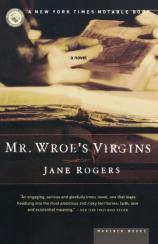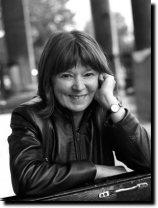Reading Group Guide
Discussion Questions
Mr. Wroe's Virgins

We hope the following questions will stimulate discussion for reading groups and for every reader provide a deeper understanding of Mr. Wroe's Virgins.
1. Why are we shown the same events from four different points of view? How do the different voices and perspectives of Leah, Joanna, Hannah, and Martha help us form a picture of the women¹s lives and of Mr. Wroe? Why do you think Wroe¹s point of view is never presented?
2. Why do you suppose Leah, Joanna, Hannah, Dinah, Rachel, Rebekah, and Martha are chosen as "comfort and succour" for Mr. Wroe? In what ways, individually and together, might they satisfy the Prophet's requirements? What strengths and deficiencies does each bring to the Prophet's household?
3. How do Leah, Joanna, Hannah, and Martha use their positions in Wroe's house to try to achieve their personal goals? To what extent does each succeed?
4. What influence does Wroe have on Leah, Joanna, Hannah, and Martha? How does he adapt his behavior to the personality of each?
5. To what extent is John Wroe a genuine religious visionary and man of God? In what ways do events confirm or contradict Hannah's early assessment: "I am sure he is a charlatan, but, I suspect, an unknowing one"? Why, in the end, does Wroe behave self-destructively?
6. Why is it that Hannah, the sole nonbeliever among the seven "virgins," establishes the fullest relationship with Mr. Wroe? Why does he communicate his view of his calling and his congregation, including their contradictions, only to Hannah?
7. How are Joanna and Martha different and similar in the visionary quality of their outlook on life? How are Hannah and Leah different and similar in their nonreligious approach to life?
8. How would you describe the relationship between the religious and the secular in the novel? To what extent is the relationship one of conflict? What balance between the two areas of life is possible?
9. What characterizes the lives of nineteenth-century women as presented by Rogers, within and outside Mr. Wroe¹s church? In what ways do "Mr. Wroe's virgins" struggle to transform their own lives and the lives of other women? How do conditions of life in the great house differ from their expectations and from their respective views of their rightful roles as women in the church and in society? Why do you think Rogers explores their lives in the setting of Wroe's household rather than in the context of their own families?
10. Leah says of Wroe, "He is the ugliest man I have ever seen, but he is powerful," and the others repeatedly refer to his power and authority. In what ways is he powerful? Where does his authority come from? What kinds of power other than that associated with Wroe appear in the novel? How does Rogers portray various kinds of power and powerlessness?
11. To what extent does Mr. Wroe's Virgins explain why people give their allegiance and lives to religions like the Christian Israelites and "prophets" like John Wroe, and why so many long for the end of the world? What differences and similarities do you see between Wroe's Christian Israelites and today's various apocalyptic congregations and cults?
12. Recalling her life with her father, Hannah says of the Christian Israelites that their "faith calls me back, back to that magic circle [of the Owenites]. How my heart yearns to be surrounded again." (51) What does each of the characters yearn for and why? How are those yearnings expressed, and how do they shape personal, social, and religious relationships?
13. How do longings for independence and freedom come into conflict with the security and serenity of belonging to a group like the Israelites? What kinds of freedom or independence do the characters seek, and how successful is are they? In what ways, to the contrary—as Hannah comments—is "the very freedom from choice of the Israelite way of life" an attraction?
14. In his Huddersfield sermon, Wroe proclaims, "God's order has been destroyed. The devil is out and about among us." To what extent is it possible to make such a claim in any age? What evidence does Wroe present in support of his claim? What evidence is presented by similar claimants today?
15. Wroe asks Hannah, "Do you think the truth of a situation may be understood by examining its external appearance?" Hannah answers, "Well, yes." How would you answer? To what extent do Hannah and the other women draw conclusions from observing only "external appearances"?
16. Martha declares of the others in the house, "I can follow each of them through the house by her smell" and describes the smell of each, including Wroe. Is the odor she associates with each person accurate and appropriate? How does Martha¹s use of all her senses and her instinctive knowledge of natural processes provide her with a more complex, more accurate, and more detailed understanding of the world? Do you find Martha's awakening convincing?
17. How do Martha's discovery and growing awareness of the world (which is for her a new world) and Hannah's vision of a new secular world compare or contrast with the Christian Israelites' vision of a New Kingdom? In what ways are Martha and Hannah more visionary than Wroe and Joanna? Why might this be so?
18. During one of their later conversations, Wroe questions Hannah: "You would not exchange this world for a better?" She replies, "I would have this one improved." To what extent does this exchange reflect the novel's primary theme?
19. After realizing that she is not pregnant, Joanna complains, "I am trapped in a small life." How is this true of each character, including John Wroe? To what extent is each character¹s behavior an attempt to break free of that entrapment?
20. As Wroe's trial approaches, Leah determines that she will make of herself "an obstacle to the coming dark. I am not—I will not be—nothing." How are Leah's actions, however negative, affirmations of life? In what way does each character—including Wroe, despite his view of life as a "void"—express this same determination to make certain that she or he "will not be—nothing"?
21. Do you agree or disagree with Hannah's final analysis of Wroe's behavior and the Christian Israelites' faith? "Of course the Israelites need the end of the world to come. Mr Wroe does, above all. So much imperfection and contradiction, there is no putting it right. It must be demolished. And in the New World that follows, they themselves will be saved; which is to say they will become single in intent, contraries will be removed. . . . Which is death. The removal of contraries is death."
This Discussion Guide was written by Hal Hager & Associates, Somerville, New Jersey.
Mr. Wroe's Virgins
- Publication Date: October 10, 2000
- Paperback: 320 pages
- Publisher: Mariner Books
- ISBN-10: 0618066136
- ISBN-13: 9780618066131







